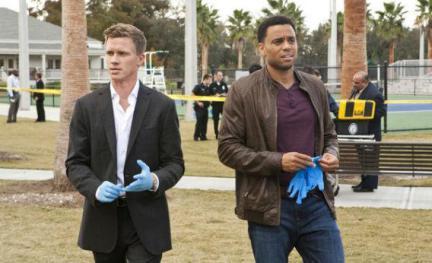 Having discovered Michael Ealy on the fun-if-not-groundbreaking Almost Human, I had to have a peek at his previous buddy cop show, USA’s Common Law. If Amost Human is a tad formulaic, Common Law is downright Screenwriting 101. But if you’re in it for the Ealy charm, you’ve come to the right place (in either case).
Having discovered Michael Ealy on the fun-if-not-groundbreaking Almost Human, I had to have a peek at his previous buddy cop show, USA’s Common Law. If Amost Human is a tad formulaic, Common Law is downright Screenwriting 101. But if you’re in it for the Ealy charm, you’ve come to the right place (in either case).
The fact that the pilot opens with a quote by Dr. Phil should maaaybe be a red flag, but give it a chance. The pilot is bookended by scenes in a group couples’ therapy session. Wes (Warren Cole) and Travis (Ealy) are the n00bs in the group, a fact that the therapist (Sonya Wolger) points out. It’s hard to tell where we are in the session, because the therapist seems well into her teaching, even handing out homework, but Wes and Travis have had no chance to introduce themselves. Naturally, everyone assumes they’re a romantically involved couple. When they start bickering about Wes’ ex, Alex, the other clients are no doubt picturing a man.
If you’ve seen even one second of the show or an ad for it, you won’t experience the surprise in evidence among the other clients. They’re not a couple; they’re partners in the LAPD. Detectives, actually. In TV World, the main characters are always detectives. They’ve been working together seven years, which I suppose is a nod to the title, or the title a nod to this fact, since seven years is the span most people associate with common law marriage. (Common law marriage actually only still exists in a few states, and if you guess which ones they are, you’ll probably be right.)
The detectives’ captain (Jack McGee, who you’ve seen on every cop show ever) is the one who has assigned them to therapy. As his two best detectives, Wes and Travis are also the “biggest pain in [his] ass.” We’re meant to take that as the reason he’s forcing them to get along better rather than just assign them each a new partner. Don’t overthink it.
The differences between the two cops are hammered home. Besides their being literally black and white, their other contrasts are highlighted early and often. Wes is a relationship guy, or was until his marriage went south. Travis is a player. Wes wears blazers and dress shoes while Travis opts for jeans, a leather jacket, and a 5 o’clock shadow at noon. Travis laughs easily while Wes takes life seriously. Wes, in fact, is kind of a dick, which makes me wonder if we’re supposed to like these guys equally, or root for Travis. But then, Bones was a wretched person for the first several episodes of her eponymous show, and audiences grew to love her.
A judge’s son is found murdered in a seedy part of town, and the duo are thrown into work. I’m getting tired of the trope in which the crime in the pilot of a cop show involves a political figure, but the case provides a backdrop. We get to see the dynamic between the two main characters. They’re indeed good at their jobs, fearless, a little foolish, and a tad darker than we may have first suspected. When Travis shoots a wacky arm-waving inflatable arm-flailing tube man, I have to wonder if it’s indicative of the kind of repressed rage that led Agent Sealy Booth to shoot a clown.
Good or bad, there is a lot of action, including a liquor store shoot-out that goes on way too long, but the action is punctuated by humor. Seeing a cop unwittingly draw on a baby is pretty funny. (Also, “untraceable bullets.” LOL.)
The murder plot aside, the pilot is less about two cops assigned to couple’s therapy and more about everyone else’s reaction to the fact that they’re in therapy. One might imagine how old that could get, and why the show lasted only one season. However, if it helped Ealy land his current role as the most loveable android since Deputy Andy, it served us well.
